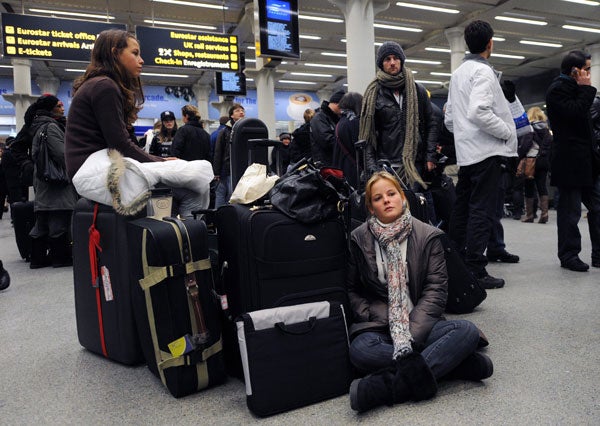Simon Calder: Keep moving - the lessons for Eurostar

Hope for the best, but be prepared for the worst: that travel maxim has been especially appropriate this week. Last Saturday hundreds of people woke up (if they had ever managed to sleep) on the floor of a Eurotunnel car-carrying shuttle, a grim dawn that beats even the morning after The Independent office party. They occupied this makeshift dormitory after being among the 2,000 people "rescued" from the five Eurostar trains that were sent into the Anglo-French hole in the ground that devours reputations as effortlessly as it does rolling stock.
Hindsight, coupled with being in the happy position of having to operate nothing more complicated than this keyboard, makes it easy to pontificate on how Eurostar could or should have handled the chaos following the train failure and the three-day closure of the link between western Europe's two biggest cities.
Given that travellers were aiming for places barely 200 miles away, could the train operator not have snapped up every spare motor coach in southern England and northern France, and lined them up outside London St Pancras and Paris Gare du Nord on Saturday morning?
Remember how we used to travel before the Tunnel opened in 1994. Passengers could have been shuttled to one of the Channel crossing routes unaffected by extreme weather – perhaps Newhaven-Dieppe, Portsmouth-Le Havre or even Harwich-Hook of Holland – and onwards to their destination. Sure, the journey would have taken five times as long as the high-speed train, but the problem may have melted away as surely as fluffy French snow in a warm tunnel.
The company did manage to charter a couple of flights on Sunday evening, and a fleet of coaches ran from Disneyland Paris. But Eurostar arranged alternative transport for only 5,000 people, about one in 20 of those hit by the three-day shutdown. People are happier when they are moving, rather than being moved along by staff at St Pancras station and asked to come back in a couple of days.
"We put in the best alternatives we could," says a Eurostar spokeswoman, "given an extreme set of circumstances".
Meanwhile a much bigger travel nightmare was unfolding in the air. Ryanair and Wizz Air passengers suffered some cancellations on Monday and Tuesday, and British Airways cancelled its entire European and domestic flight programme from Heathrow after 7pm on Monday. But by Tuesday then, Britain's leading budget airline, easyJet, was in far worse shape. It was hit by extreme weather at some of its Continental airports, including Geneva and Milan, as well as snow and ice in the UK.
If easyJet says "80 per cent of our flights are operating", that spells chaos: with more than 1,000 scheduled departures each day, it means least 200 cancellations. Which, with every available seat taken, equals 30,000 people failing to travel. Multiply that by several days and with lesser problems across other airlines, and I reckon that as many as 200,000 travellers woke up on Christmas morning somewhere they were not expecting to be.
The only word for their dismal circumstances is "festation". It's a variant on that unlikeable construct, the "staycation". When a planned festive vacation is scuppered, and you end up festering at home, that's a festation.
Among the disappointed people at St Pancras last weekend were 71 individuals whose plans for the weekend had been wrecked by that dodgy French snow. They were the drivers of Eurostar trains whose industrial action that day was rendered irrelevant, since nature combined with technology had proved as effective as a walk-out. But their union, Aslef, has done UK travellers proud: announcing a separate Christmas and New Year strike, this time on lines south of London, for which an astonishing amount of notice has been given.
The train drivers' union is unhappy about the decision by Southern Trains not to classify the Monday after Christmas as a public holiday, thereby depriving members of some useful overtime pay. Aslef has therefore notified the public of a proposed strike for 27 December 2010, with further action on 3 January 2011. This will affect some train services between central London and Gatwick airport.
True, the union has also called drivers out next Tuesday, but with alternatives such as First Capital Connect – not to mention National Express and easyBus – hardly anyone will care. Warning prospective passengers about a strike the year after next is about as benign as transport disruption gets. And who knows: the dispute might even be settled by 2011.
Cool down, everyone
The wrong kind of country? That was the national sentiment as everywhere from Basingstoke to Blackpool airport ground to a halt.
In one high-pressure interview last Saturday, Eurostar's chief executive, Richard Brown, inadvertently talked about the difficult timing for travellers "in the build-up to Easter".
In the event, most Eurostar passengers were successfully delivered in advance of Christmas. But as his company gets back on track, it is fair to reflect that almost all the time, our transport system works better than we have the right to expect in a crowded, complicated nation with vintage infrastructure held together with string.
If Reading becomes gridlocked because of ice and snow, as it did on Tuesday, that does not mean an end to western civilisation – nor even Great Western trains, which continued to serve the town. Expect a government initiative to counter chilling to be announced very soon, whereupon we will forget all about it until the next cold snap.
Subscribe to Independent Premium to bookmark this article
Want to bookmark your favourite articles and stories to read or reference later? Start your Independent Premium subscription today.

Join our commenting forum
Join thought-provoking conversations, follow other Independent readers and see their replies